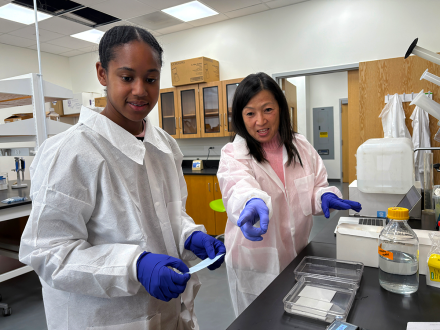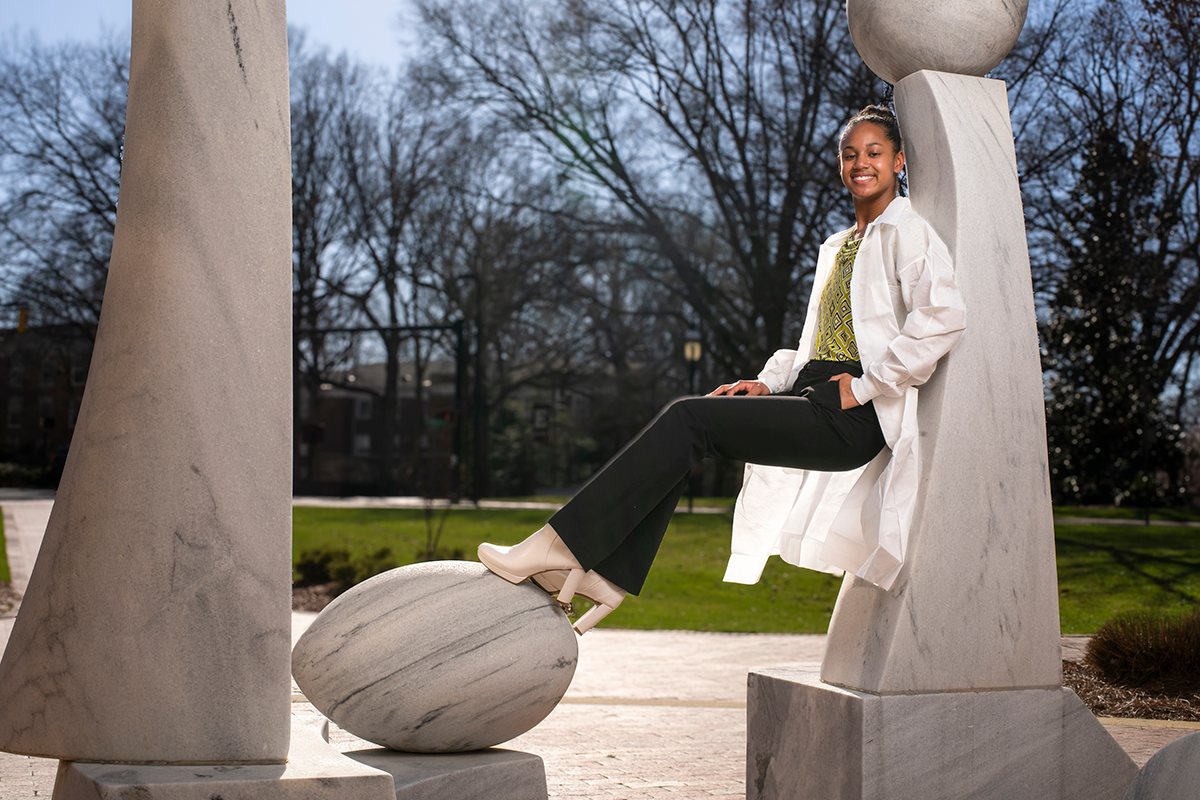Victory Moore ’25 is turning ambition into action, using Elon’s resources to pursue cancer research and her dream of launching a lab.
Victory Moore comes at you like a freight train wearing a million-dollar smile.
Get her talking — about medical science and research, Renaissance art, music, literature and culture, her close-knit family, Christian faith and friends — and her hands become a blur as she recounts facts and details with a wide-eyed grin. Moore is ever in pursuit of the next opportunity to learn, the next friend to share with and the next place to invest her supernova energy.
Her curiosity is boundless. Her dreams, even more so.
Moore arrived at Elon with a clear vision: to cultivate the scientific skills needed to develop cancer therapeutics and one day establish her own independent research lab.
Along the way to earning a biology degree with concentrations in biotechnology and molecular biology, she’s built relationships in every corner of campus and leveraged them into opportunities. Even before day one, she’d connected with the Student Professional Development Center staff at a spring admitted students’ event to begin inquiring about summer internship opportunities.
Her contagious energy makes a strong impression. From the start of her time at Elon, she sought out opportunities and asked the right questions, building a network of mentors and supporters along the way. “She has a definite goal, and she knows how to get allies in her corner,” says Yuko Miyamoto, associate professor of biology and Moore’s research mentor.
Whether in the lab, the classroom or among friends, Moore’s confidence and curiosity make her a force to be reckoned with. “Victory is the kind of person who can and does talk to anyone,” says Heather Shevach ’25, Moore’s best friend.
It’s a skill Moore developed from an early age, encouraged by her family.
“My mom always says, ‘You have to share your dream. If you don’t share it, no one will know,’” Moore says. “What I love about Elon is how information spreads by word-of-mouth. People know each other, and they know about great opportunities. It’s a matter of getting connected.”

Finding Her Path
From as young as she can remember, Moore has wanted to know why. She questions everything, and often.
“I want to pick at the things that I don’t understand,” Moore says. “I’ll question for deeper understanding, but also to be challenging. We need to exceed our foundational knowledge to become flexible thinkers. We’re leaving something on the table if we don’t question beyond the obvious.”
Her interest in science began in Mrs. Duong’s seventh-grade science class at West Cary Middle School in Cary, North Carolina. The lesson was on DNA. Contemplating the mysteries of genetic sequencing and individuality captivated her. Rolling over ideas and questions, she would sketch the familiar double helix in notebooks and on whiteboards in her mother’s office. More questions followed. Seeking answers set her on a path toward a career in science.
Brain cancer claimed her uncle’s life when he was 10 years old. The echoes of that family trauma, years before she was born, focused her on finding a cure for lethal cancers. She often sat with her grandfather, who would admit he couldn’t quite grasp the scientific concepts she described, but — along with the rest of the family — encouraged her to follow her dreams. Those led to her nomination by a high school teacher for the National Academy of Future Physicians and Medical Scientists, which she exuberantly joined.
Admitted to Elon, Moore was poised to seize opportunities here. Brooke Buffington, former assistant vice president for the SPDC, clearly recalls her first interaction with the confident, enthusiastic senior in high school. Buffington presented the SPDC’s mission to support students in identifying career paths and linking them to advantageous jobs and internships.
“At the end, Victory walked up and introduced herself and told me that she was interested in summer internships and research at labs,” Buffington says. “I told her, ‘That’s great, we’d love to help you. Come back and see me when you get here in the fall.’”
Sure enough, a few weeks into her first year, Moore was in Buffington’s office polishing her résumé and application materials for the National Science Foundation Clemson University Biophysics Research Experiences for Undergraduates. With the SPDC’s support, she was hired as an intern in her first year, focusing on genetics and biophysics research.
“I learned the hard way that research is powered by your organization, your motivation and your planning,” Moore says. “It eventually became second nature, and from there, I just wanted to do more of it.”
Like clockwork, each fall Moore returned to the SPDC for support with application materials. She and Buffington would pass drafts back and forth, polishing them for success. After her sophomore year, she worked at the National Institute of Environmental Health Sciences in Durham, North Carolina, researching DNA replication in yeast. Her summer 2024 experience came directly from connections made at Elon.
During her junior year, Samuel Ramirez ’24 invited her to an on-campus talk about glioblastoma, a type of brain cancer, and how its cells have their own ecosystems and mutations, by Michalina Janiszewska, assistant professor at the Herbert Wertheim UF Scripps Institute for Biomedical Innovation and Technology. Janiszewska mentored Ramirez during a summer experience at Scripps. Enthralled, Moore attended a post-lecture dinner with the scientist and was encouraged to apply for an internship.
“I had my heart and mind set on working in her lab, and that’s what I did. We hit the ground running,” Moore says of her time in the Jupiter, Florida, lab, where she investigated brain cancer cell populations in different biological environments.
“None of these experiences were because of me. Yeah, I’m motivated, but you need a network, connection and information,” she says. “The biology department filled in the gaps for me.”
Rising Above Challenges
Her accomplishments haven’t come without setbacks. In her sophomore year, Moore suffered a concussion in a car accident. The recovery was long and slow, and she dealt with post-concussion syndrome that included months of care in outpatient facilities in the Raleigh area. Her father would rush her from appointments back to campus in time for her classes.
The condition affected her recall and ability to learn new material during some of the most challenging undergraduate biology courses.
“We need to exceed our foundational knowledge to become flexible thinkers. We’re leaving something on the table if we don’t question beyond the obvious.” — Victory Moore ’25
“What kept me positive was Heather,” Moore says of Shevach. Shevach and Moore met in their Elon 1010 class, stayed close and roomed together in their sophomore year, bonding over episodes of “Chicago Med” and home-cooked brunches. Together with Ella Nutt ’25, they stayed up into the wee hours many nights studying, drilling with flashcards and reviewing material. “I didn’t feel alone, and the sense of sisterhood between us mended what I needed in that time,” Moore says.
“Victory is incredibly caring and outgoing,” Shevach says. “She’s incredibly good at what she does, and she will do anything to meet her goals, but she doesn’t let that get in the way of friendships. We’re each other’s first person to call if we need anything.”
She also found support among Elon’s faculty and staff, whom she often invited to personal events and research presentation practice sessions with her family.
As the director of health professions advising at Elon, Miyamoto has taught and advised Moore for the past several years. With Miyamoto’s mentorship, Moore is investigating the protein p53 and its behavior under chemotherapy in pancreatic cancer. p53 polices the cell cycle, and it can trigger cellular repair or cellular death. Hers is a continuation of research by Lauren Copenhaver ’24, and Moore is characteristically focused on determining the “why” behind the protein’s fickle behavior.
“I want her to set herself up for success, and I don’t want anything to harm her enthusiasm and curiosity for science,” Miyamoto says. “I want her to thrive.”
During a challenging situation at a summer internship, Miyamoto helped her navigate workplace relationships and focus on the valuable professional experience gained there.
“Dr. Miyamoto is like my on-campus aunt,” Moore says. “She’s a sounding board, and she’s very straightforward and supportive. I needed a home base here, and Dr. Miyamoto is that.”
She wants to return that support to the students following after her. In her sophomore year, she founded Pioneer 3000, an annual summit for underserved middle and high schoolers in Wake County, North Carolina. She gathers college students from Elon and elsewhere, along with professionals, for practical panel discussions about college-going knowledge, selecting a major and finding a career.
“It can be so overwhelming when you’re young and have so many options,” Moore says. “I wanted to relieve the anxiety and give them space to consider what they want to achieve and get them thinking about it early.”
Ready for What’s Next
Moore’s persistence has made her successful at Elon and prepared her for future accomplishments. She’s applying for post-baccalaureate research experiences at Duke University, the University of North Carolina at Chapel Hill and the National Institutes of Health. She plans to earn advanced degrees, including a doctorate, in cancer biology and cancer genetics.
“She is mature, determined and resilient,” Buffington says. “What she’s trying to do isn’t easy, and it’s taken a lot of work. She’s stayed positive, even when situations tested her resolve. That’s one of the key traits that will make her successful in a challenging field.”
Though it’s a long road ahead, her goal of becoming a research scientist and founding her own lab is that much closer to reality with an Elon degree soon displayed next to the vision board on her wall.
She’s as determined as ever.
“At the end of my life, I want to be able to say I made a valuable contribution to curing at least one type of cancer,” Moore says. “I have the smarts, resources and creativity going for me, but they add up to nothing if I don’t contribute in the long run. That gets me up in the morning.”



